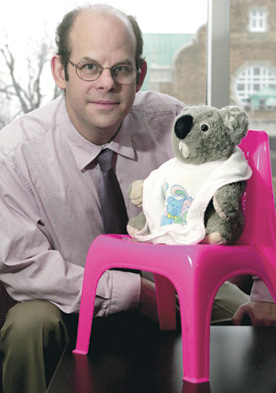New psychologist studies toddlers, awarded chair

David Forman and his colleagues used baby furniture and a teddy bear in their study of toddlers.
Photo by Andrew Dobrowolskyj
This has been a good year for assistant psychology professor David Forman.
In July he arrived in Montreal to start his new job at Concordia, a move that has delighted him. In October the appearance of his latest research paper drew attention from as far away as Lithuania. And in November he learned that he has been awarded a Canada Research Chair.
Forman, who is associated with the Centre for Research in Human Development, will use the award to pursue his two main fields of research: children’s eagerness to learn from their parents, and children whose mothers who suffer from post-partum depression.
“I’m over my head with ideas, and each one leads to more questions,” he said enthusiastically.
Brought up near New York City, Forman worked as an artist in the Boston area for some time before going back to school to study psychology. He said his art was always very psychological, and played with ideas about what it was to be human. “Right now I’m still doing that, just in a different way,” he said.
Forman obtained his PhD in 2002 from the University of Iowa and did post-doctoral work at the University of Minnesota.
While in Minnesota he wrote the paper that has garnered so much interest since it appeared last month in Psychological Science, a journal of the American Psychological Society. The study’s basic finding was that toddlers who eagerly imitate their mothers become preschoolers with well-developed consciences.
“This subject matter is important, because developing self-control, following the rules, and feeling connected enough to feel bad when you hurt someone are important aspects of developing citizens,” Forman said.
In the study, he observed the children at 14 and 22 months of age as they imitated their mothers do tasks like wipe a table, feed a teddy bear a bottle, and have a play tea party. The same children returned at 33 and 45 months.
Then they were observed as they played a game with an attractive prize that could only be won by cheating. They were also given toys that were rigged to fall apart as soon as they touched them, but that the children were told were special and valuable.
The results showed a clear link between toddler-age readiness to imitate and pre-school-age conscience, both in terms of internalized conduct (not cheating at the game when left alone) and guilty feelings when the rigged toy broke.
“These findings were quite strong. It is something to predict from a 14-month-old to a 45-month-old.
“And it makes sense. We know children can learn right and wrong through imitation. If they watch someone behave aggressively, they will be aggressive, and when they see someone behave with self-control and follow the rules, they’ll do the same.
“What is new here is that idea that individual differences among children starting very young can predict something about their moral behavior a couple of years later.” He noted, for example, that some of the children did not even seem to notice when the valuable toy broke, while others seemed devastated.
As for the origins of these differences in imitation, “some children may simply come into the world more socially responsive than others,” he said, “but the relationship the mother and child have together also has something to do with it.”
Whatever its implications, this study has attracted interest from a science society in Lithuania, as well as the CBC and Psychology Today magazine.
Forman is now starting to set up his lab and will continue his research on his own, with the help of undergraduate volunteers, until he takes on graduate students next year.
He plans to continue studying how children learn by imitation, and to observe young children practising musical instruments with their parents.
He also hopes to explore the role of emotion in parent-child relationship development, and socialization processes in families where the mothers develop depression after giving birth.